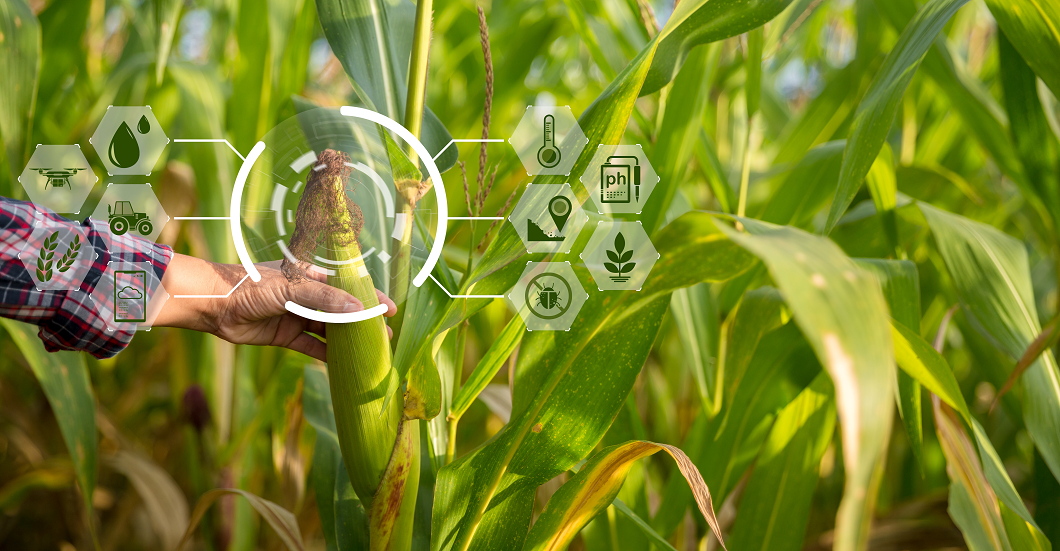Supporting tech innovation that enhances the lives of smallholders
Technology is transforming how we all live and work. In the world of commodities, it has the power to connect groups such as smallholder farmers to higher value markets and create equitable value chains that increase incomes and support sustainability. In turn, tech innovation is playing a growing and vital role in our mission to reduce commodity dependence.
It is also key to the United Nations's global action plan for family farming. Clovis Freire, who leads UNCTAD's work on technology and innovation policy research, has said: "Increasing the access of young farmers to technologies can expand rural employment opportunities and enhance the sustainability of family farming."
To unlock the potential of technology requires investment in forward-thinking agribusinesses and organisations, which is why we’re eager to support innovation through our work.
Here are some of the ways the businesses we invest in are using technology to improve lives.
Collecting, analysing and verifying high-quality data
Netherlands-based firm Meridia is driving transparency in food chains and ensuring the equitable treatment of smallholder farmers.
Chief Executive Officer Thomas Vaassen describes Meridia as "a geospatial data company that puts farmers' at the centre of its work to make supply chains transparent, sustainable, and inclusive of smallholders."
The firm specialises in collecting, analysing, and verifying high-quality data in smallholder supply chains. This helps food companies achieve environmental, social and governance (ESG) standards and compliance, while enabling smallholders to access regulated markets, sustainability programmes and investment.
Farmers also gain better insights into their productivity and a deeper understanding of their businesses. For example, exact farm size and production data informs accurate yield per farm calculations. While clear parcel boundaries lower the risk of conflict in communities. This verified data also enables smallholders to secure land rights for themselves and future generations.
Opening access to funding that drives growth
Our Technical Assistance Facility has supported the development of a financial inclusivity app by mPex International, designed to connect agri-SMEs to vital funding.
The app enables agribusinesses that often struggle to access financing from local banks to take out loans quickly and easily. From the lenders’ perspective, the app gives them access to business information and real-time performance monitoring that drives faster, more effective lending decisions.
This kind of financing can be the difference between an agribusiness that simply survives and an agribusiness that thrives and creates greater economic opportunity locally. It gives SMEs the ability to invest in their businesses and offer smallholder farmers more secure livelihoods.
Providing security for street recyclers
MUTA is on a mission to expand the circular economy in Colombia and beyond through innovation, while improving the lives and livelihoods of informal street recyclers. At the heart of this is its self-built Smart Recycling platform which connects people and businesses with materials such as used cooking oil, to recyclers who transport them to MUTA collection points. MUTA then processes the cooking oil so that it can be used as a biofuel.
Working through the platform with MUTA provides security to street recyclers. Not only do they have access to regular formalised work, but it has also more than doubled their incomes from recycling and provides them with benefits such as healthcare and paid holidays.
Increasing supply chain transparency
Many of the agribusiness we invest in use traceability software to ensure the equitability and sustainability of their supply chains are. Traceability tools map supply chains from end to end and enable everyone along the supply chain to verify products are sustainably produced and smallholders are paid fairly.
This level of information is required to break into higher value markets and comply with rising standards. For example, the European Union’s Corporate Sustainability Reporting Directive came into effect in January this year, with European Sustainability Reporting Standards, which encompass a company’s entire value chain, to follow in 2024.
For Natural Extract Industries (NEI), a vanilla processing business in Tanzania, this technology supports its commitment to make direct payments to its thousands of smallholder suppliers, so they receive greater rewards for their crops. The company uses the SourceTrace platform to manage its outgrower network, track key field work data and provide farm-to-fork traceability.
Organic Kenyan avocado oil processer Olivado EPZ also uses SourceTrace to collect crop and production data, enabling it to carry out the certification process for Fair for Life and Global Gap within the platform.
Supporting smallholders’ financial independence
Understanding the challenges specific smallholders face is the key to identifying the most appropriate tech tools. This can result in simple but effective solutions.
Exotic EPZ, a women-led macadamia processor and trader in Kenya is working with a telecom company to enable direct payments to its smallholder suppliers, who it paid a total of USD 3 million in 2022.
Mobile coverage is high in Kenya and basic handsets can be bought cheaply, so it is a widely accessible payment solution. Smallholders who don’t have a bank account, can be paid directly into a mobile wallet, which they can use in local stores and to pay school fees. This strengthens their financial independence which many, particularly women, lack and ensures they receive full value for their crops.
This is snapshot of how some of the investments we support use technology. As capabilities accelerate, the potential to transform the lives of smallholders will grow. We are always keen to hear about innovation in the agriculture and development sectors, so please get in touch if your organisation uses tech to enhance its work with smallholders.

